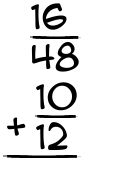What is 16/48 + 10/12?

|
This is how you add
|
||||||||||||||||||||||||||||||||
Step 1We have to make sure the denominators are equal. Since 12 is evenly divided by 48, we can multiply just one term to get a common denominator. Multiply 10 by 4, and get 40, then we multiply 12 by 4 and get 48. The problem now has new fractions to add:
|
||||||||||||||||||||||||||||||||
Step 2Since our denominators match, we can add the numerators. 16 + 40 = 56 The sum we get is
|
||||||||||||||||||||||||||||||||
Step 3The last step is to reduce the fraction if we can. To find out, we try dividing it by 2... Are both the numerator and the denominator evenly divisible by 2? Yes! So we reduce it:
So far so good... let's try to divide by that number again. Are both the numerator and the denominator evenly divisible by 2? Yes! So we reduce it:
So far so good... let's try to divide by that number again. Are both the numerator and the denominator evenly divisible by 2? Yes! So we reduce it:
So far so good... let's try to divide by that number again. No good. So next you try the next prime number, which is 3... No good. So next you try the next prime number, which is 5... No good. So next you try the next prime number, which is 7... No good. 7 is larger than 6. So we're done reducing. And we're done! Here's the final answer to 16/48 + 10/12
|